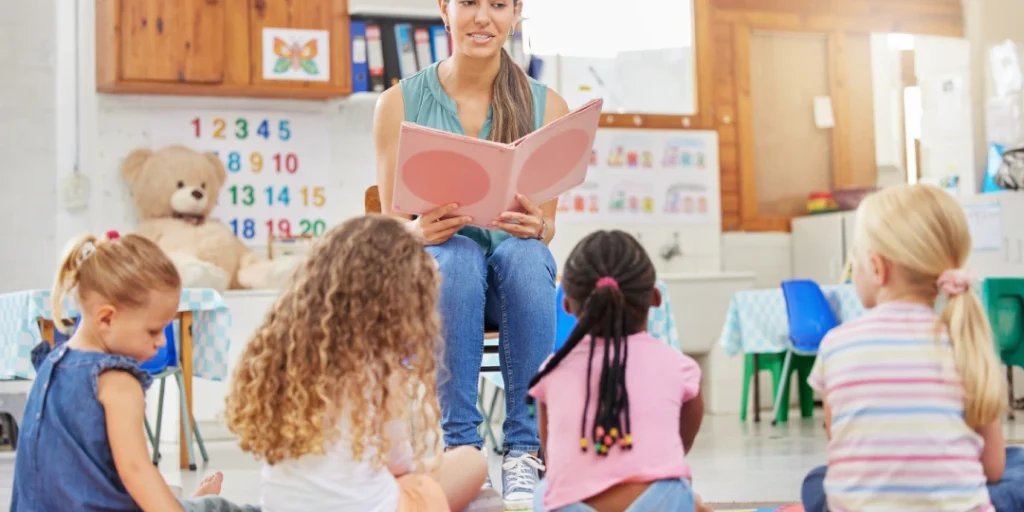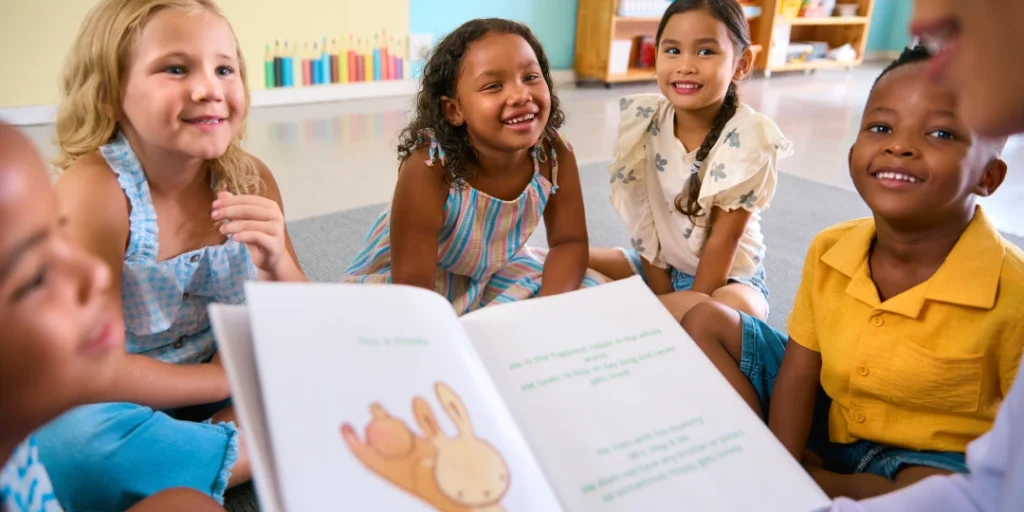![Nurturing Young Minds: Inside Murfreesboro Children’s Academy’s Innovative Approach to Early Education Introduction: Redefining Early Education Murfreesboro Children’s Academy redefines what early education can achieve by treating the preschool years not as a precursor to “real” learning, but as the critical foundation […]](https://dayschools.org/mca/wp-content/uploads/2025/05/Murfreesboro-Childrens-Academy.webp)
Table of Contents
Introduction: Redefining Early Education
Murfreesboro Children’s Academy redefines what early education can achieve by treating the preschool years not as a precursor to “real” learning, but as the critical foundation of a child’s intellectual, emotional, and social life. This elevated approach situates MCA not just as a childcare provider, but as an institution focused on developmental excellence. While many programs emphasize routine or rote activities, Murfreesboro Children’s Academy engages children in an enriched, thoughtfully curated environment that honors each stage of their early development.
Located in a community that values family, growth, and education, Murfreesboro Children’s Academy serves as a beacon for parents seeking more than a standard curriculum. The academy crafts experiences designed to cultivate resilience, empathy, and a sense of wonder in its students. This is achieved through meticulously designed classrooms, nurturing educators, and a philosophy that values process over product. Each day at MCA offers children opportunities to interact with the world in ways that ignite curiosity and foster confidence.
What distinguishes Murfreesboro Children’s Academy is its understanding that early education is about shaping character and capacity as much as it is about introducing academics. In this view, childhood is not merely a preparation for adulthood, but a vibrant period of life deserving of dignity, joy, and intentional cultivation. Through this lens, MCA orchestrates a learning rhythm—steady, meaningful, and holistic—setting children on a trajectory toward lifelong success and well-being.
The Philosophy Behind Murfreesboro Children’s Academy’s Pedagogical Framework
The pedagogical philosophy of Murfreesboro Children’s Academy is rooted in the belief that children are inherently capable and innately driven to explore the world around them. Drawing inspiration from time-honored educational methodologies such as Montessori, Reggio Emilia, and constructivist models, MCA frames learning as an active, inquiry-based process. Rather than presenting information for passive consumption, educators at MCA encourage children to ask questions, test ideas, and construct their own understanding of the world. This approach honors the individuality of each child and prioritizes critical thinking from the earliest stages of development.
At Murfreesboro Children’s Academy, classrooms are purposefully designed to function as laboratories of learning—dynamic, adaptable spaces that respond to the evolving interests and needs of the children. Educators function not as directors, but as guides and collaborators. They observe carefully, pose thought-provoking questions, and offer resources that deepen each child’s exploration. This pedagogical stance fosters autonomy and builds the foundational skills for independent learning. It also reflects a broader commitment to nurturing a child’s intrinsic motivation, rather than conditioning them to perform for external rewards.
The emphasis on intentional inquiry at Murfreesboro Children’s Academy cultivates a culture where curiosity is celebrated and mistakes are viewed as essential to growth. This philosophy creates an environment where children are safe to express ideas, challenge assumptions, and engage deeply with complex topics—even at a very young age. By prioritizing discovery over memorization and exploration over rigid structure, MCA ensures that students not only acquire knowledge but also learn how to learn. This creates a robust foundation for both academic achievement and emotional resilience in future educational environments.

A Curriculum Rooted in Cognitive and Emotional Development
Murfreesboro Children’s Academy implements a curriculum that recognizes the inseparability of intellectual growth and emotional well-being. Learning is not compartmentalized but viewed as a comprehensive experience that activates both hemispheres of a child’s development. At MCA, activities are intentionally designed to stretch the young brain’s potential—enhancing language acquisition, executive functioning, memory processing, and problem-solving—while also cultivating emotional literacy and self-awareness. These twin priorities ensure that children leave not only smarter but stronger in character.
The daily rhythm at Murfreesboro Children’s Academy includes carefully sequenced activities that stimulate emerging cognitive faculties. Storytelling circles enhance narrative memory and vocabulary. Structured reasoning games refine logic and sequencing. Music, rhythm, and movement sessions activate pattern recognition and motor coordination. But more than ticking boxes of traditional academia, MCA seeks to inspire joy in learning—where children experience the thrill of discovery and the satisfaction of making connections, not merely reciting facts.
Equally important is the academy’s unwavering emphasis on emotional development. From peer conflict resolution to identifying and expressing feelings, Murfreesboro Children’s Academy fosters environments where social-emotional growth is intentionally guided. Teachers model empathy and coach children through real-life interactions, ensuring they gain tools to navigate relationships and articulate emotions effectively. This emotional scaffolding not only nurtures happier children but also sets the groundwork for empathy, self-regulation, and cooperative learning—hallmarks of future success both in and beyond the classroom.
Embracing Play as a Foundation for Learning
At Murfreesboro Children’s Academy, play is not a reward for completing “real work”—it is the work. MCA champions the idea that play is the most powerful and developmentally appropriate learning vehicle available to young minds. Through play, children develop essential cognitive schemas, learn social negotiation, and engage in abstract thinking. MCA structures its day to allow for both guided and unstructured play, creating opportunities for children to experiment, reflect, and refine their understanding through active, joyful engagement.
Educational play at Murfreesboro Children’s Academy is richly layered. A child constructing a tower is not merely stacking blocks—they are exploring concepts of balance, gravity, spatial awareness, and collaboration. A make-believe post office or grocery store becomes a fertile ground for developing narrative skills, numeracy, and social roles. Teachers facilitate these moments with subtle interventions, asking probing questions or introducing materials that enhance the depth and direction of play without hijacking the child’s autonomy.
Beyond its cognitive benefits, play at MCA also serves as a practice ground for critical life skills. Through imaginative scenarios and shared activities, children learn conflict resolution, turn-taking, leadership, and compromise. Murfreesboro Children’s Academy views these skills not as tangential, but as integral to a well-rounded education. By treating play as both a science and an art, MCA builds a culture where joy and rigor coexist—making learning both meaningful and memorable.
Multisensory Learning Environments that Stimulate Growth
Murfreesboro Children’s Academy understands that young children engage with the world through all their senses—and so it crafts environments that respond to this instinctual modality of learning. Rather than relying solely on visual or auditory instruction, MCA designs classrooms and play areas that stimulate touch, smell, movement, and even taste. The result is a rich, immersive educational experience that deepens retention, nurtures creativity, and accommodates varied learning styles.
Each classroom at Murfreesboro Children’s Academy is a symphony of sensory inputs. Soft lighting, textured surfaces, calming scents, and natural elements combine to create spaces that are both stimulating and soothing. Sensory tables brimming with rice, beans, or water allow for fine motor exploration and early math concepts like volume and measurement. Art stations offer a range of materials—clay, fabric, wood, paint—encouraging expression through texture and form. These environments are not incidental; they are purpose-built to expand the ways children engage with content.
The multisensory approach also supports inclusive education, recognizing that not all children absorb information in the same way. For the tactile learner, a letter traced in sand may be more meaningful than one printed on paper. For the kinesthetic child, jumping through a sequence of numbers etched on the floor may unlock mathematical fluency. Murfreesboro Children’s Academy tailors its instruction to meet children where they are, offering a learning experience that is not only effective but profoundly human. Through these carefully designed environments, MCA nurtures minds, bodies, and spirits in tandem.

The Role of Educators: Mentors, Not Just Instructors
At Murfreesboro Children’s Academy, educators are not confined to the traditional role of instructors delivering predefined lessons. Instead, they are seen as mentors and co-learners—facilitators of growth who adapt and respond to each child’s evolving needs. These educators act with intentionality and emotional intelligence, observing closely, listening deeply, and offering meaningful interventions at just the right moment. Their work is not to impose knowledge but to provoke thought, nurture curiosity, and support self-discovery.
Teachers at Murfreesboro Children’s Academy engage in a continual process of reflection and professional development. They study developmental patterns, remain informed by contemporary pedagogical research, and collaborate to refine their practices. Each educator is trained to identify individual learning styles, adapt instruction accordingly, and scaffold children’s thinking without diminishing their agency. This balance between guidance and autonomy is a hallmark of MCA’s professional culture—where teaching is a dynamic, responsive craft rather than a static routine.
The emotional presence of teachers at MCA is just as impactful as their instructional acumen. They cultivate trust, model respectful behavior, and provide secure attachment figures for young children navigating the complexities of group settings. By fostering emotionally safe and intellectually rich environments, Murfreesboro Children’s Academy ensures that its educators are not just delivering lessons but shaping lives—one mindful interaction at a time.
Cultivating Emotional Intelligence and Social Skills
Murfreesboro Children’s Academy holds emotional intelligence as a cornerstone of its educational philosophy. The capacity to understand, express, and manage emotions is taught with the same seriousness as literacy or numeracy. Children at MCA learn that feelings are not only valid but also valuable—that frustration, joy, sadness, and excitement are signals to be understood and integrated. This emphasis on emotional awareness equips children with the tools to thrive in both academic and interpersonal realms.
In practice, emotional intelligence is woven into the daily fabric of life at Murfreesboro Children’s Academy. Teachers use reflective language, storytelling, role-play, and mindfulness activities to help children name and process their feelings. When conflicts arise—as they naturally do—educators guide students through restorative practices rather than punitive responses. They facilitate peer-to-peer dialogue, helping children develop empathy, patience, and perspective-taking. This creates a culture where emotions are not feared or suppressed, but skillfully navigated.
Social skills development is equally prioritized. Cooperative games, group projects, and classroom responsibilities teach the importance of sharing, listening, negotiating, and leading. At Murfreesboro Children’s Academy, children learn to contribute to a community, recognize group dynamics, and understand their impact on others. This social-emotional grounding prepares them not only for academic success but for a lifetime of healthy relationships, collaborative work, and civic engagement.
Integrating Nature and Outdoor Learning
Nature is not an afterthought at Murfreesboro Children’s Academy—it is an essential teacher in its own right. MCA recognizes that outdoor environments stimulate a different kind of learning, one rooted in sensory experience, physical movement, and ecological awareness. The academy’s outdoor curriculum is designed to immerse children in the rhythms and patterns of the natural world, fostering curiosity, resilience, and a sense of stewardship for the environment.
Children at Murfreesboro Children’s Academy engage with nature through dedicated learning gardens, exploratory trails, and hands-on ecological activities. They plant seeds, observe the life cycles of butterflies, track seasonal changes, and examine the interdependence of living things. These experiences not only teach scientific principles but also promote mindfulness and groundedness. Dirt-covered hands and sunlit play are not distractions—they are integral to building observational skills, patience, and wonder.
The academy also uses nature as a platform for social and emotional learning. Group hikes become exercises in cooperation and communication. Outdoor problem-solving activities challenge students to think critically and work as a team. Weather, terrain, and spontaneous wildlife sightings offer unpredictability that sharpens adaptability and resilience. At Murfreesboro Children’s Academy, the outdoors becomes more than a backdrop—it is a dynamic classroom that fosters holistic growth across cognitive, emotional, and physical domains.
Fostering Parent Partnership and Community Involvement
Murfreesboro Children’s Academy understands that early education thrives when it is reinforced beyond the classroom. As such, MCA nurtures an active and inclusive partnership with families, recognizing parents as vital collaborators in each child’s educational journey. The academy invests time in building trust, transparency, and mutual respect—laying the foundation for a cohesive and supportive learning environment that extends into the home and community.
Communication is frequent, clear, and meaningful. Parents at Murfreesboro Children’s Academy are kept closely informed of their child’s progress through detailed portfolios, regular conferences, and digital updates. More than just passive recipients of information, parents are invited to participate in classroom activities, contribute to projects, and join school-wide events that celebrate learning milestones and cultural traditions. This deepens their connection to the school and allows children to see their families and educators working in harmony.
MCA’s community engagement efforts go beyond family involvement to include partnerships with local organizations, service projects, and seasonal celebrations. Whether through food drives, garden days, or intergenerational activities with local seniors, Murfreesboro Children’s Academy cultivates a spirit of belonging and civic responsibility. Children grow up understanding that they are part of something larger than themselves—a community that values cooperation, compassion, and collective growth.

Inclusivity and Individualized Learning Paths
Inclusivity is a foundational value at Murfreesboro Children’s Academy. The school does not subscribe to a one-size-fits-all model; instead, it embraces the diversity of learning styles, backgrounds, abilities, and interests that each child brings. MCA ensures that every student is seen, heard, and valued—creating a classroom culture where difference is not just accommodated, but celebrated as a source of strength and creativity.
Teachers at Murfreesboro Children’s Academy use differentiated instruction to tailor learning experiences that align with each child’s unique needs. Through ongoing assessment and attentive observation, they modify lesson delivery, materials, and groupings to ensure optimal engagement. A child who thrives in kinetic activities might learn counting through movement games, while a more introspective peer might prefer puzzles or visual aids. This adaptive approach helps each student access the curriculum in a way that resonates with their natural inclinations.
Moreover, inclusivity at MCA goes beyond academic differentiation. Cultural awareness, empathy training, and inclusive storytelling ensure that children see themselves reflected in the curriculum and in their peers. Teachers are equipped to support learners with varying physical, emotional, or developmental needs, offering interventions that preserve dignity and autonomy. At Murfreesboro Children’s Academy, the classroom becomes a place where all children—not just some—are empowered to reach their fullest potential.
Conclusion: The Enduring Impact of Thoughtful Early Learning
The legacy of Murfreesboro Children’s Academy lies not just in its curriculum, but in the lives it shapes. MCA has cultivated a philosophy of early education that honors the child as a whole person—intellectually curious, emotionally rich, and socially capable. Its holistic, research-based approach ensures that children are not just taught, but deeply understood and compassionately guided. The results are evident in the confidence, creativity, and kindness with which its students engage the world.
Long after their days at Murfreesboro Children’s Academy, students carry with them a set of deeply embedded values and capabilities. They approach learning as a joyful pursuit, relationships as opportunities for empathy, and challenges as chances for growth. This enduring foundation sets them apart, allowing them to flourish not only in school but in life. They are not simply well-prepared—they are well-formed.
In a landscape where early childhood education often prioritizes efficiency over enrichment, Murfreesboro Children’s Academy offers a different path: one of intention, presence, and profound care. It is a place where young minds are nurtured with wisdom and where the seeds of future achievement are planted with hope. Through its thoughtful practices and enduring vision, MCA reminds us all that how we educate our youngest learners shapes not just their future, but the future of our communities and world.





Leave a Reply